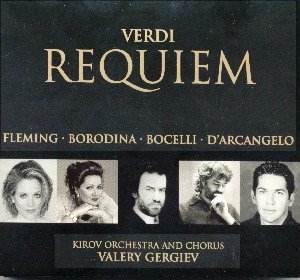VERDI
Requiem
 Renée Fleming
(soprano)
Renée Fleming
(soprano)
Olga Borodina (mezzo-soprano)
Andrea Bocelli (tenor)
Ildebrando D'Arcangelo (bass)
Kirov Orchestra and Chorus, Mariinsky Theatre, St Petersburg/Valery Gergiev
 PHILIPS 468 079-2,
2 CDs [87.32], Full Price
PHILIPS 468 079-2,
2 CDs [87.32], Full Price
Crotchet
AmazonUK
AmazonUS

This is the first of a couple of new recordings of Verdi's great
Requiem scheduled to appear in the composer's centenary year. It is
not quite what I had expected.
Gergiev, so often a revelatory conductor in Verdi, is here a model of restraint.
He gives us a rather under-characterised reading of the score, with tempi
either unduly slow (as throughout the entire development of the Dies
Irae) or verging on the hysterical (as in the Offertorio). This
is rarely a moving performance and often one that hangs fire.
If this performance does not recall the high octane energy of Riccardo Muti's
justly famous Philharmonia account it also fails to compare with the similar
design that Victor de Sabata brought to his studio recording of the work
for EMI. There are moments where Gergiev is slower than de Sabata (in the
Quid sum miser section and in the closing Libera Me, for example),
but largely he is slightly quicker in his pacing even though he fails to
convey the Verdian drama forever present in this largely unliturgical work
. Nowhere does Gergiev begin to match the sheer reverence which de Sabata
brings to this work - controversial though that conductor's interpretation
remains.
Part of the problem is Gergiev's quartet of soloists. Olga Borodina is truly
outstanding in the mezzo part but she is the lone virtue of this set. Renée
Fleming has the voice to hit her top Cs and B flats instinctively, and with
precision, but she is perhaps a shade overwhelmed when the orchestra are
playing fff, her voice slightly immersed by the balance. The two male
singers are simply out of their depth. Andrea Bocelli is probably the 'brightest'
tenor I have heard in this work, his voice blindingly light in tone. I imagine
looking at an eclipse would produce much the same effect on the eyes as his
performance does on the ears throughout this recording. His first entrance
in the opening Requiem is shockingly prosaic and he doesn't really
improve from there, and his phrasing in the Ingemisco is simply bland.
Ildebrando D'Arcangelo (a singer I have not previously heard) is no match
for the great basses who have sung this role - Giulini's Nicolai Ghiaurov,
Muti's incomparable Evgeny Nestorenko or de Sabata's Cesare Siepi to name
three. Ironically, he suffers from the same problem as Bocelli - a brightness
of tone and a plangency of expression. Both suffer from a warbling tendency.
All of this is unfortunate because the Kirov Orchestra and Choir are both
first rate. The recording is just magnificent - one of the best ever given
to this work. The acoustic of All Hallows Church really opens up the textures
of this work - the chorus being a particular triumph of lucidity and clarity.
And the opening of the Dies Irae is truly thunderous and genuinely
thrilling.
This would be reason enough for me to return to this recording - for it really
is a sonic spectacular. However, the three indispensable recordings of the
Requiem to acquire are Gardiner's period instrument performance (with
a wonderful quartet and sound), Muti's Philharmonia version, a white hot
reading of considerable stature, and Claudio Abbado's Edinburgh Festival
recording from 1982 with a dream cast of Margaret Price, Jessye Norman, Jose
Carreras and Ruggiero Raimondi. Available on Arthaus DVD it is everything
Gergiev's reading ought to have been but isn't. One hopes that Abbado's recording
for EMI (due out next month) meets the inspirational qualities of this fabulous
performance.
Marc Bridle

